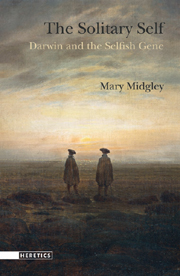Book contents
3 - The natural springs of morality
Summary
Intelligence and remorse
This determined hostility of biologists to group selection is just one expression of the gulf that has opened between Darwin's own approach and the social atomism preached by those who claim to be his followers: both the “social Darwinists” in his own day and the neo-Darwinists now. Social atomism is not really an essential part of the idea of evolution. It is essentially political: an ideology shaped by Enlightenment individualism, one that takes different forms according to the political and social pressures of the day. Its first strong expression was Hobbes's sharp reaction against religious wars and it still echoes the simplistic rhetoric of its founder. It is not interested in relating its findings to the emotional complexity of our actual lives. And, because it comes from a political context, it is habitually polemical, dealing in extremes. I shall try later to look at this very important element in our thought in its own terms and consider how we ought to use it.
But it needs to be kept separate from Darwin. He, by contrast, was trying to grasp how something as complex as actual human motivation – including moral sensibility – could possibly have evolved. He wanted to understand it ethologically, as an expression of the lifestyle of our species. And, unlike many people who attempt this, he did not simplify his task by reducing humans to stereotypical animals. He looked at both people and the various kinds of animals in their actual bewildering complexity. And he started his enquiry from one of the most puzzling human traits – morality – because he thought it so central.
- Type
- Chapter
- Information
- The Solitary SelfDarwin and the Selfish Gene, pp. 55 - 72Publisher: Acumen PublishingPrint publication year: 2010



